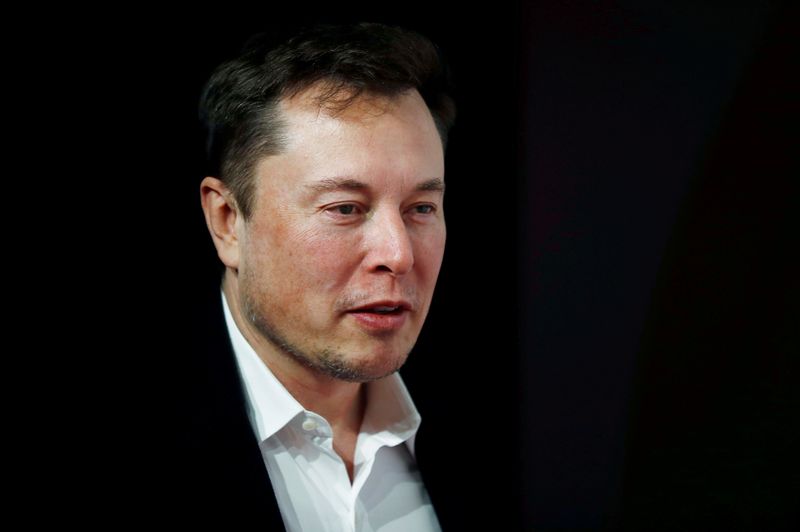By Tom Hals and Nichola Groom
WILMINGTON, Del. (Reuters) - Elon Musk is expected to defend a $2.2 billion deal in court next week criticized by shareholders as benefiting Musk at the expense of Tesla (NASDAQ:TSLA) Inc, and the outcome may depend as much on the chief executive's temperament as on the facts of the case.
The electric vehicle maker's unconventional CEO has shown two sides in recent court proceedings -- one polite and respectful, the other evasive and taunting.
It remains to be seen which Musk will show up on Monday at a Delaware court, the nation's leader on corporate issues, when he squares off against union pension funds and asset managers who claim they were misled about the benefits of Tesla buying SolarCity in 2016 for $2.2 billion.
Getting it wrong could cost Musk more than $1 billion.
“If you seem arrogant in court, you may be signing your own economic death warrant," said John Coffee, a securities professor at Columbia Law School.
This may be particularly true in Delaware's Court of Chancery, with roots in medieval England and known for its decorum.
Musk and his lawyers did not respond to a request for comment.
Smashing corporate norms has come to define Musk, who has a cult-like following for his ambitious vision, battles with short-sellers and disdain for "boring bonehead questions" from analysts.
In the Delaware case, shareholders claim SolarCity, a rooftop solar energy company, was secretly on the brink of bankruptcy when Tesla purchased it. They argue the deal benefited Musk, SolarCity's largest shareholder, his cousins who co-founded the firm, and Tesla directors who owned stakes in SolarCity.
Investors want Musk to surrender the 2.2 million shares of Tesla he received in the deal, which on Thursday were worth about $1.2 billion.
Musk has countered that Tesla's stock has tripled since the deal, demonstrating its value. SolarCity has withered because its staff were redirected toward launching the Model 3 sedan, a make-or-break product for Tesla, not because the solar business lacked value, according to Musk.
The Tesla directors who approved the deal settled allegations against themselves in January for $60 million, which was paid from insurance. They denied wrongdoing.
Musk has dug in his heels.
During a June deposition, Musk clashed with shareholder lawyer Randy Baron, calling him "reprehensible," doubting his emotional well-being and avoiding many questions.
He went on tangents about Tesla's solar potential, lamented both the decline of U.S. manufacturing and the large size of the legal industry and asked Baron if he was only motivated by money. Baron declined to comment.
In contrast, at a defamation trial in December, Musk donned a dark suit, spoke softly on the witness stand, and apologized to the cave rescuer who sued Musk for calling him a "pedo guy" on Twitter.
Musk portrayed himself as overworked, hounded by critics and earnest in his desire to help in the rescue of 12 boys and their soccer coach from a flooded cave in Thailand.
The strategy appeared to pay off when a jury ruled in Musk's favor and rejected the $190 million claim against him.
The SolarCity case will be decided by Vice Chancellor Joseph Slights.
The court has its own cult-like following for its scholarly opinions that often run more than 100 pages and which have shaped Corporate America.
"The big question is when you get an institution like him and an institution like the Court of Chancery, is it oil and water or is it mutual respect?" said Larry Hamermesh, a professor at Delaware Law School.
Executives often struggle with testimony because they think of themselves as the smartest in the room, according to University of Pennsylvania Law School Professor Jill Fisch.
"That works against them in depositions and is even worse in court. It tends to piss off a judge," said Fisch.
David Murdock, the CEO of Dole Food Co Inc, went to Delaware to defend his 2013 buyout of the fruit company, and sunk himself with bizarre, rambling and combative testimony. He was ordered to pay former shareholders $148 million.
"By dint of his prodigious wealth and power, he has grown accustomed to deference," wrote the judge, Vice Chancellor Travis Laster, of Murdock. "That habit serves a witness poorly when he faces a skilled cross-examiner."
